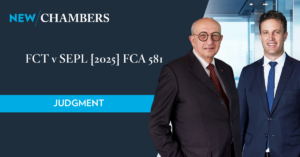
New Chambers’ the Honourable Tony Pagone AM KC and Chris Peadon appeared for the Commissioner in a successful fringe benefits tax (FBT) appeal in FCT v SEPL [2025] FCA 581.
The decision considers key aspects of the FBT regime, including:
- “who is an employee”
- the application of the principles drawn from the decision in J &G Knowles as to whether a benefit is provided “in respect of employment”.
In summary, the taxpayer was a family discretionary trust that carried on a large scale and very profitable business. There was a large number of discretionary beneficiaries of the trust, including the three brothers who were directors of the corporate trustee. They worked full-time in the business. They agreed between themselves to split the profits of the business between their respective families. They also caused the trustee to acquire 40 or so high performance and luxury vehicles of which they had exclusive use. The Commissioner assessed the trust to additional FBT on the value attributable to their personnel use of those vehicles. The trustee objected on the basis that they were not “employees” and the conferral of the use of the vehicles was not “in respect of employment”, relying on the leading authority of J&G Knowles. The Tribunal found for the taxpayers. The Commissioner appealed to the Federal Court. O’Sullivan J allowed the Commissioner’s appeal.
As to the who is an “employee”, O’Sullivan J confirmed that:
- the subjective views of the relevant persons are not to the point;
- the question must be addressed in the context of the statutory regime, not by asking whether a person is an employee at common law, noting that the statutory regime expands the meaning of “employee” beyond its common law meaning.
Having regard to the particular facts of the case, O’Sullivan J concluded that only one conclusion was open to the Tribunal, that is, that the brothers were “employees”.
As to whether the benefit was conferred “in respect of employment”, the taxpayer contended that there was not “a sufficient or material relationship between the benefit and employment” because the brothers were in a position analogous to the directors in the J & G Knowles (2000) 96 FCR 402, where it was concluded that the directors of the trustee of a unit (or fixed) trust conferred benefits on themselves not as employees but because they were the ultimate owners of the trust and its assets, noting that the directors in that case held the units in the unit trust via other entities they controlled.
On appeal, O’Sullvan J rejected that the brothers were in the same position as the directors of the unit trust in J & G Knowles. O’Sullivan J observed that “the brothers cannot be regarded as the exclusive ‘owners’ or ultimate beneficial owners of the Taxpayer [the trust] or its assets.” Rather, having regard to the facts, there was a sufficient and material relationship between the brothers’ employment and the benefit of the vehicles to conclude that the benefit was provided “in respect of employment”.
In light of the above, the case has particular relevance to circumstances in which benefits (other than trust distributions) are conferred on directors of a discretionary trust.
Back to all